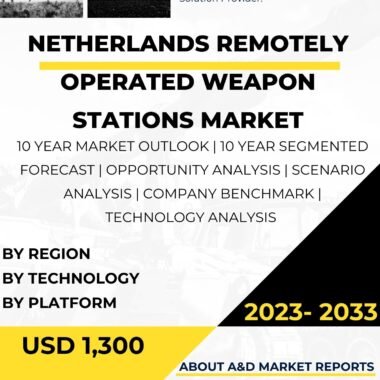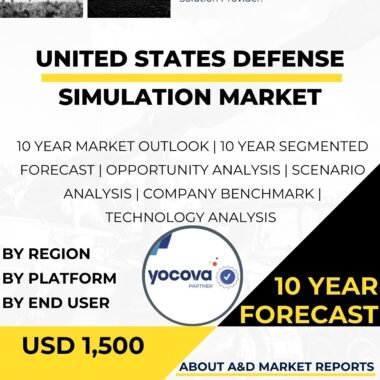Description
The Internet of Things (IoT) refers to a network of interconnected devices and sensors that can collect, exchange, and analyze data through the internet. IoT technology has seen significant adoption across various industries, and the defense sector is no exception. In the Netherlands, as a technologically advanced nation with a strong focus on defense modernization, the integration of IoT into defense systems and operations holds considerable potential for enhancing situational awareness, operational efficiency, and decision-making capabilities.
In the context of the Netherlands Defense market, IoT can be applied to various domains, including command and control, intelligence gathering, logistics, maintenance, and personnel safety. The use of IoT technologies in defense can transform traditional operational paradigms and provide the Dutch Armed Forces with a competitive advantage in modern warfare.
One of the primary applications of IoT in the Netherlands Defense market is in the area of command and control. IoT-enabled devices and sensors can be deployed across military assets, including vehicles, aircraft, and naval vessels, to gather real-time data on their status, location, and performance. This data is transmitted and aggregated through secure communication networks, providing commanders with a comprehensive and dynamic view of the battlespace. Improved situational awareness allows for more informed and timely decision-making, enabling Dutch forces to respond quickly and effectively to emerging threats and changing mission requirements.
Moreover, the Netherlands IoT in Defense market addresses the requirements of intelligence gathering and reconnaissance. Deploying IoT sensors in remote or hostile areas can aid in monitoring activities, detecting potential threats, and gathering intelligence data. Drones equipped with IoT capabilities can be employed for aerial surveillance and reconnaissance, further enhancing the Dutch Armed Forces’ ability to gather critical information in a safer and more cost-effective manner.
Additionally, IoT technology can revolutionize defense logistics and supply chain management. By embedding IoT sensors in equipment, ammunition, and spare parts, defense logistics personnel can monitor the status and location of critical assets in real time. This enables better inventory management, reduced downtime, and optimized maintenance schedules. With improved logistics efficiency, the Dutch Armed Forces can maintain a higher level of operational readiness and deploy resources more effectively during military operations.
Furthermore, IoT in the Netherlands Defense market can enhance predictive maintenance capabilities. By utilizing IoT sensors to monitor the health and performance of military equipment, maintenance teams can identify potential issues before they escalate into significant problems. This proactive approach to maintenance reduces the risk of unexpected equipment failures and increases the longevity of defense assets, resulting in cost savings and improved mission success rates.
In the realm of personnel safety, IoT technologies can play a vital role in monitoring and protecting military personnel during training and operations. Wearable IoT devices can track vital signs and environmental conditions, providing real-time health data to ensure soldiers’ well-being and safety during demanding tasks and deployments.
The Netherlands’ dedication to innovation is evident in the development and integration of advanced IoT technologies in the defense sector. The Dutch defense industry actively collaborates with technology companies, research institutions, and international partners to explore advancements in IoT sensors, data analytics, cybersecurity, and communication systems. These collaborations drive improvements in IoT capabilities, data security, interoperability, and overall system performance, positioning the Netherlands at the forefront of IoT implementation in defense.
The export potential of IoT technologies is also significant. The Netherlands’ reputation for high-quality defense systems and its expertise in IoT technology have generated interest from other nations seeking to enhance their own military capabilities. Exporting advanced IoT systems not only supports the Dutch defense industry but also fosters international cooperation and strengthens defense ties with partner countries.
Challenges in the Netherlands IoT in Defense market include the need to address cybersecurity risks and data privacy concerns. As IoT devices and sensors proliferate across defense networks, ensuring the integrity and security of data transmissions and communications is crucial to safeguarding sensitive military information from potential cyber threats.
Additionally, the Netherlands IoT in Defense market must consider the challenge of interoperability and standardization. As defense systems incorporate IoT devices from various manufacturers and suppliers, ensuring seamless communication and data exchange between different platforms is essential for maximizing the benefits of IoT technology.
Furthermore, the Netherlands IoT in Defense market must focus on the development of robust training and education programs for military personnel. The successful integration of IoT technologies requires soldiers and personnel to understand how to effectively use IoT data to enhance decision-making and operational effectiveness.
In conclusion, while there might not be publicly available specific data on a separate “Netherlands IoT in Defense Market,” the broader context of IoT technology in the Netherlands defense industry is of paramount importance for enhancing situational awareness, operational efficiency, and decision-making capabilities. IoT technologies offer transformative opportunities for command and control, intelligence gathering, logistics, maintenance, and personnel safety in the Dutch Armed Forces. The Netherlands’ focus on IoT technology and innovation demonstrates its dedication to providing the highest level of operational readiness and effectiveness for its defense forces. Collaborations with technology companies and research institutions, export opportunities, and a dedication to innovation have positioned the Netherlands as a key player in the global IoT in Defense market. As the Dutch defense industry continues to invest in research and development, advancements in IoT technology will be essential to optimizing military capabilities and maintaining security and readiness in the Netherlands and beyond.




